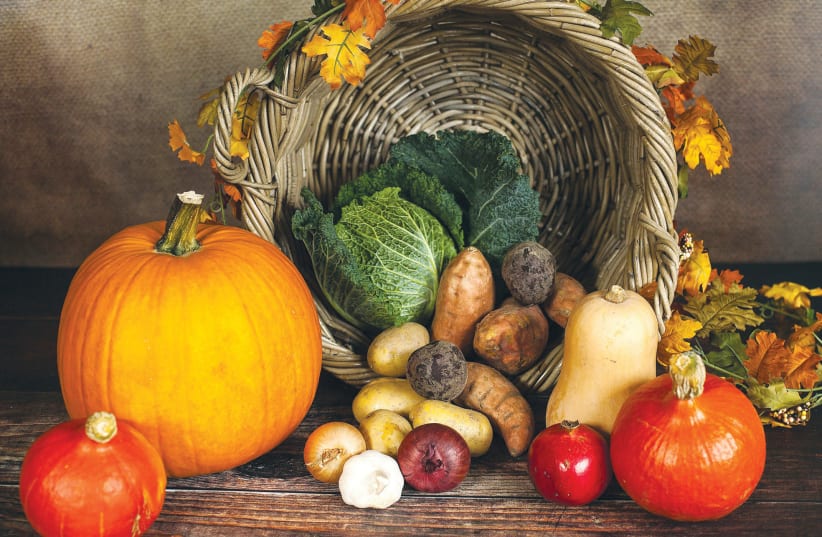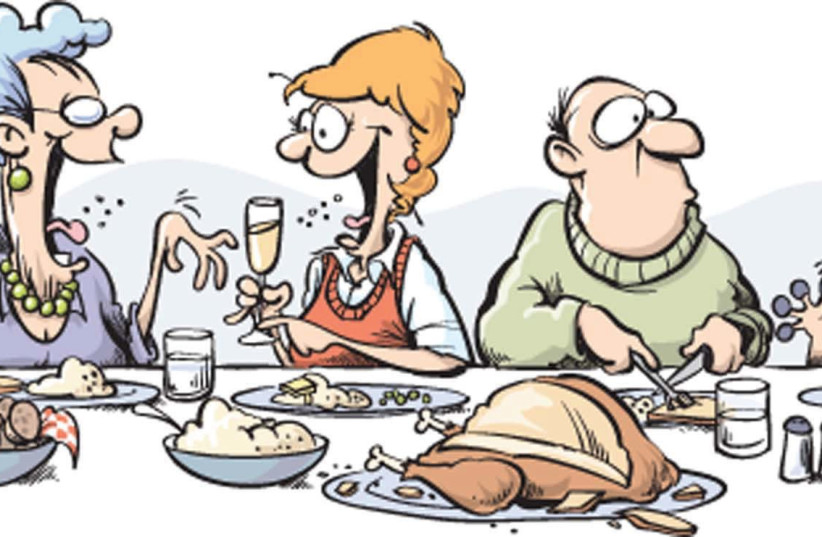Amal Ras, 40 years old, is far away from her home in Kansas City. She moved to the West Bank a few years ago with her four children and her husband when he started a business venture in Ramallah.
"We miss all the holidays but the one we miss the most is Thanksgiving," says Ras, as she goes over her Thanksgiving menu.
Thanksgiving is the quintessential American holiday, and Americans living in countries around the world pull out the stops to celebrate, especially in the Middle East. While some scramble to find the traditional Thanksgiving trimmings, others add foods and activities from their new homelands to their holiday celebration.
"Arabs and Palestinians’ lives revolve around social gatherings and food. This is why I adore this day. It's an opportunity to meet with relatives and friends that you don’t see all year," Ras said.
Ras told The Media Line that she doesn’t have many American or Palestinian-American friends living nearby throughout most the year. Most of the residents of her village of Turmus Aya, located near the West Bank city of Ramallah, live during most of the year in the United States and come back to the village to visit during the summer months. They are not in the village at Thanksgiving time.
"They only come to visit in the summer, so really its only my husband and the kids celebrating it," she said.
Palestinian Americans celebrate Thanksgiving with some changes, in part because “it’s not easy finding all the fixings – a turkey, cranberries and stuffing – here. We have to make do with what’s available,” Ras said.
She says that she has to improvise when making Thanksgiving dinner.
"Not all ingredients are available; I order my turkey a month in advance from a butcher in Ramallah," Ras explained.
She adds that Thanksgiving at her house has a "Palestinian flavor.”
"I make my own stuffing, it’s basically ground lamb, pine nuts, onions with spices with rice. You'll also find hummus, mtabal (an eggplant spread), and lots of pickles," she said. Thanksgiving this year will certainly be different from last year, when the coronavirus forced people to stay indoors and not mingle or gather in one place. Many expat Americans in the Middle East missed out on having a traditional holiday meal with family or friends.
"It's all about family gatherings, and food. Two pillars of Palestinian social fabric," said Hamza Akel, who was born in Chicago to Palestinian parents.
Akel came back to the West Bank this year to help his extended family harvest olives, and decided to remain until the end of the year.
"As a Palestinian-American, Thanksgiving is an especially wonderful holiday because we are obsessed with food, and there's always relatives and guests in our home," he said. Akel says there's a lot to be thankful for this year, most importantly seeing his grandparents after a separation of two years.
"I couldn’t come the last couple of years because of corona, my grandparents are old, and I love spending time with them. I am thankful for that," he said.
Joseph Gitler, the founder and chairman of Leket Israel, the national food bank, moved to Israel 21 years ago but still celebrates Thanksgiving every year. “This year we will be celebrating in America,” he told The Media Line a few days before the holiday. “We leave tomorrow to be with my mother and brothers and their families; particularly when Hanukkah hits the calendar at the same time as Thanksgiving, there is an extra opportunity to meet with family.” Hanukkah begins on Sunday night.
Gitler said that he grew up always celebrating Thanksgiving even though his Yeshiva Jewish day school had classes on Thanksgiving. He recalls that he always skipped school that day to attend the Macy’s Thanksgiving Day Parade.
“For my family it was the holiday we most connected with as Jews, knowing what we have been through as a people we have tremendous gratitude for being treated as humans should be,” he said.
“In Israel, people are celebrating,” he said of Americans who moved to Israel. “We all understand anyone who made aliyah (immigrated to Israel) from America didn’t come because they needed to flee. Everyone came here out of their own free will, so people still feel connected and love for the country they grew up in, and it’s heartening to seepeople still showing their gratitude to the United States of America. My five American kids understand what it’s all about.”
Jay M. Shultz, president of the Am Yisrael Foundation, the largest Jewish young adult community nonprofit in the world, headquartered in Tel Aviv, thinks about the act of giving thanks on Thanksgiving.
“There should be no tension for American Jews on Thanksgiving. The Jewish people can only have gratitude to the United States for the past 200 years of civil and political support. But today, we have so much more to be thankful for,” he said. “Specifically, we need to have boundless thanks to God for finally granting us the Land of Israel, ensuring a safer, stronger Jew regardless of the community they live in worldwide.”
The owner of the Rafael Butcher Shop in the Machane Yehuda Market in Jerusalem told The Media Line that he has "the usual" number of turkeys in stock this year ahead of
Thanksgiving. The turkeys generally are sold whole and at a weight of between 4 kg, or nearly 9 pounds, and 6 kg, or about 13 pounds. Whole turkeys need to be ordered in advance, he warns. In addition, he says, hotels are ordering turkeys for Thanksgiving weekend "at the usual rate."
David Parsons, who is originally from The Outer Banks of North Carolina, has lived in Israel for the last 24 years, but Thanksgiving still remains important to him. Parsons, the vice president and senior spokesman for the International Christian Embassy Jerusalem, a Christian Zionist organization, said that “I am especially thankful this year for health,and home, and family. I am trying to not let COVID affect my Thanksgiving in any way.” He knows his way around celebrating the holiday outside of the United States.
“The first thing that you need to do to celebrate Thanksgiving in Israel, is you need to learn to say hodu shalem at the souk so they know that you want a whole turkey, and not just parts,” he explained. “Look, I've tried to celebrate it every year here with my family. It's trying to do all of the turkey and the trimmings, and especially to invite a lotof other Americans over. A lot of the Christians we have on staff here are single. They don't have family here, and it's always nice to bring them. I often invite some other people to introduce them to the holiday.”
He added: “I think this year it is especially important to observe it, [and] not to skip, because in light of all that we've been through over the past two years with the pandemic, there is every reason in the world to be thankful to God for health, and home, and family over this year.”

